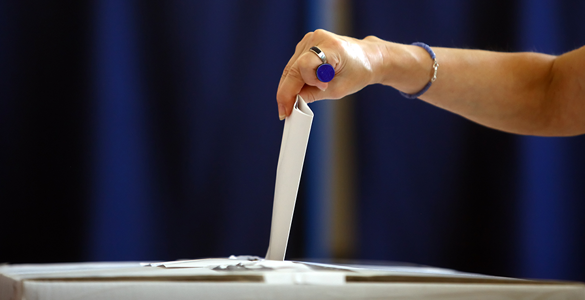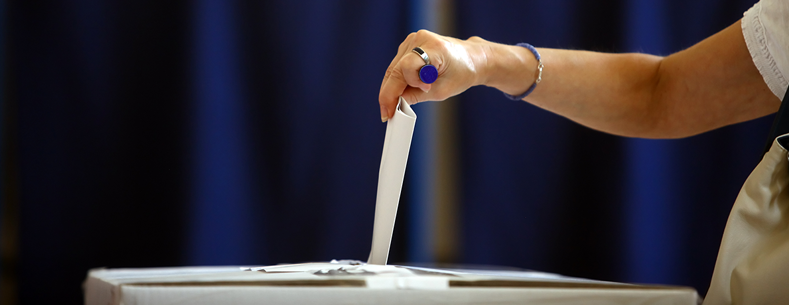The fifth Senedd is nearing its conclusion, and the next Senedd general election is scheduled for 6 May 2021. However, consideration is now being given as to how the running of the election could be affected by the coronavirus pandemic.
The Welsh Government established an Elections Planning Group in June to consider the potential impact of coronavirus restrictions on the administration of the election and whether adjustments were needed to the relevant legislation to ensure a safe election.
The Group’s report was published on 6 November, and it was debated in plenary on 17 November.
Members across the political spectrum agreed that, as far as possible, the election should go ahead as planned in May. However, while there is general agreement that contingency arrangements should be put in place to make the election as safe as possible, the scope and breadth of such measures is proving controversial.
Who was on the Elections Planning Group?
The Group was established by the Welsh Government. It met five times and consisted of political parties, Welsh and UK government officials, and stakeholders involved in running the election, such as the Electoral Commission and returning officers.
What did the Elections Planning Group find?
The Group agreed a set of principles and conclusions to support more detailed planning and preparations for the election, including:
- The continuing aim should be for the Senedd elections to be held on 6 May as planned;
- To achieve this, they recommend considering ways of instilling flexibility into the election planning process which reflects public health advice;
- There should be an early drive to encourage postal vote applications, especially for voters who have previously been shielding or those considered vulnerable;
- Some degree of greater flexibilities in respect of postal and proxy votes may be appropriate while maintaining appropriate checks to protect against the risk of voting fraud. However, this requires further detailed consideration;
- Voting should be considered a ‘reasonable excuse’ for leaving the house if any coronavirus regulations are in place at the time of an election; and
- The count could be conducted over an extended timeframe if this would greater protect the health and safety of those involved.
However, the Group did not agree on all matters. Most notably, there was no overall consensus on the need for contingency arrangements to postpone the election.
Might the election be postponed?
The notion of postponing the election is controversial.
The First Minister has stated it was “not right that this Senedd should be extended beyond its current term” and that he feels strongly “the Senedd needs a democratic refresh”. But he has also stated that it would be irresponsible of the Welsh Government “not to make plans in case the pandemic is so serious in May of next year where it wouldn’t be safe to hold an election.”
In the debate on the Group’s report, Adam Price MS found it difficult to anticipate a situation where the election would need to be postponed, but he thought it was reasonable that the Senedd should have the ability “to respond to all scenarios”. However, Paul Davies MS argued there was no reason why the elections can't take place on 6 May given that Spain, Poland, France and South Korea had “held some elections safely during the pandemic”.
Using existing powers, the Llywydd has discretion to bring the election forward by a month, or postpone it until 6 June 2021. The only option for postponing the election beyond this date is primary legislation.
There are various ways primary legislation could be structured to achieve this, but the Group only reported on one: extending the existing power of the Llywydd to vary the date of the election by more than a month. The report says most political parties were willing to consider this as a “contingency measure in extremis”, but there was no consensus across the whole Group.
The First Minister has acknowledged that increasing the Llywydd’s powers to vary the election would be a “major constitutional step” which required safeguards. He suggested that before the Llywydd could exercise any extended postponement powers, it may require a two thirds ‘supermajority’ vote in the Senedd. It was also suggested that conditions could be attached to be power compelling the Llywydd to consult the most recent advice and information on public health issues at the time.
Next steps: a Bill in January?
Before the debate, the First Minister had confirmed that the Welsh Government would implement the Election Planning Group’s areas of agreement, outlined above.
The First Minister has now confirmed that the Welsh Government is preparing a draft Bill enabling the Llywydd to postpone the election for up to six months if necessary.
The Scottish Government introduced a similar bill this week making contingency arrangements for the Scottish Parliament elections which are scheduled for the same date. But the Welsh Government’s Bill is not expected to be introduced before January, giving Ministers time to assess after Christmas whether a Bill is needed as a ‘last resort’.
The First Minister also announced that the Welsh Government is also considering the benefits of reducing the Senedd’s dissolution period. Dissolution is the official term for ending a parliament and usually takes place a few weeks before an election. The Scottish Government’s Bill, if passed, would move the Scottish Parliament’s dissolution to the day before the election, enabling Members to pass emergency legislation to delay the election if required.
The 2021 election was already going to be historic as it will be the first Senedd election that will allow 16 and 17 year olds to vote in Wales. However, it may also be historic for other reasons as the First Minister announced that the Welsh Government is considering establishing early voting centres, allowing people to vote in a staggered fashion in the days leading up to election day.
Article by Gruffydd Owen, Senedd Research, Welsh Parliament






